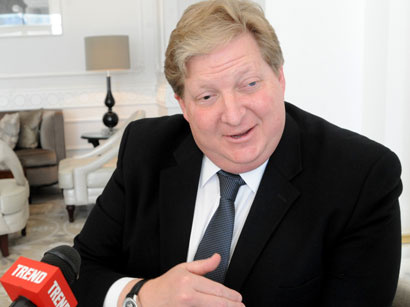U.S. should take leading role in Nagorno-Karabakh settlement: diplomat

By Sara Rajabova
The United States should take a leading role in resolving the Armenia-Azerbaijan Nagorno-Karabakh conflict, former US Deputy Assistant Secretary of State David A. Merkel has said.
"I think it is important with regard to Nagorno-Karabakh for the United States to take a leadership role in resolving this issue," Merkel, who is on a visit to Baku, told Trend news agency.
Merkel noted that Russia should also play a more flexible role in the conflict settlement.
The diplomat said he and many others have called on the White House administration to appoint a high-ranking envoy -- someone who would be able to engage with the region and get Moscow to be more flexible to achieve a peaceful solution of the Nagorno-Karabakh conflict.
Merkel considers enforcement of the four UN Security Council resolutions on Nagorno-Karabakh as important. "I think it is so important for the UN Security Council, for Azerbaijan's allies, to really call for the implementation of those resolutions," he said.
Meanwhile, Russia said it is ready to continue arranging meetings between the parties to the Karabakh conflict.
"We are ready for that, and the conflict parties should also be ready," Russian Ambassador to Azerbaijan Vladimir Dorokhin told journalists recently.
Furthermore, President Vladimir Putin's special representative Sergei Markov said that Russia is aware of its responsibility over the Nagorno-Karabakh conflict settlement, ATV TV channel reported.
"Russia is well aware of its responsibility in the resolution of the Nagorno-Karabakh conflict. Therefore, Russia will further do its utmost to advance the negotiation process," Markov said.
According to him, former Russian President Dmitry Medvedev's attempts on the resolution of the conflict indicated how determined Moscow is to reach peace.
"Unfortunately, Medvedev's efforts didn't yield results. We are exhausted, but not desperate. At present we are thinking how to change the strategy in order to move forward the process from the deadlock," Markov said.
He also said his country is well aware that it is not only impossible, but even very dangerous to keep the conflict protracted. Therefore, the conflict should be resolved soon on the basis of international law, will of the people and the principles of justice, Markov underlined.
"We are well aware of the public opinion in Azerbaijan regarding the conflict. The people rightly require not to prolong the resolution of the conflict for a few more years," the diplomat said.
He added that Moscow will fulfill its duties henceforth, in order to find a common language between the two neighboring countries and reach sustainable peace in the region.
The conflict between the two South Caucasus countries began in 1988 when Armenia made territorial claims against Azerbaijan. Since a lengthy war in the early 1990s that displaced over one million Azerbaijanis, Armenian armed forces have occupied 20 percent of Azerbaijan's territory, including the Nagorno-Karabakh region and seven surrounding districts.
Azerbaijan and Armenia signed a ceasefire agreement in 1994. OSCE Minsk Group co-chairs Russia, France and the U.S. are currently mediating peace talks. The negotiations have been largely fruitless so far.
Armenia has not yet implemented the U.N. Security Council's four resolutions urging its pullout from the occupied Azerbaijani territories.
Peace talks are underway on the basis of a peace outline proposed by the Minsk Group co-chairs and dubbed the Madrid Principles, also known as Basic Principles. The document envisions a return of the territories surrounding Nagorno-Karabakh to Azerbaijani control; determining the final legal status of Nagorno-Karabakh; a corridor linking Armenia to the region; and the right of all internally displaced persons to return home.
Here we are to serve you with news right now. It does not cost much, but worth your attention.
Choose to support open, independent, quality journalism and subscribe on a monthly basis.
By subscribing to our online newspaper, you can have full digital access to all news, analysis, and much more.
You can also follow AzerNEWS on Twitter @AzerNewsAz or Facebook @AzerNewsNewspaper
Thank you!
